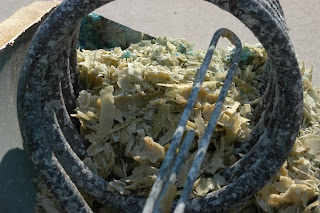
FREE energy saving device
It virtually amounts to FREE ENERGY if you install a LITTLE PLUMBER water conditioner.
“Why” you ask?
If you live in a hard water area then you will undoubtedly be aware of the crusty formation of limescale around your taps and in your kettle.
What you can’t see is the layer upon layer of scale that has deposited on the heat exchangers in you boiler or hot water cylinder. These deposits can cause you huge energy loss because the heat generated simply cannot escape the heating elements to heat up the water. The limescale effectively acts as an insulator and stops generated heat from heating the water and this can cost a huge amount in extra wasted energy. Most domestic boilers in hard water areas will lose around £120 to £200 worth of energy in a year. The bigger the property, the more energy will be wasted.
Add to this the additional cost of replacing appliances like Dishwashers, Washing Machines plus the cost of corrosive chemicals to try and prevent limescale forming. Plus of course the additional cost of softeners salt and soaps to try and cope with all the problems of hard water and you can see that the total amount of money you waste each year is pretty substantial.
Enter the Little Plumber, which starts at under £100.00 and is absolutely GUARANTEED to remove and prevent limescale. In fact it is so good that Splendid Products Ltd who make the unit in Oxford will actually give you your money back if for “any reason” you are not completely satisfied with its performance.
So, by fitting a Little Plumber unit you will actually save more in a year than the unit costs you. You don’t have to be Einstein to work out that the saving is more than the cost so therefore the unit is virtually free. And if the saving in energy bills is greater than the cost of the unit then you are probably looking at a device that is not only FREE but will actually save you even more than it costs to start with.
Oh, and don’t forget…..it’s made in ENGLAND!!
It virtually amounts to FREE ENERGY if you install a LITTLE PLUMBER water conditioner.
“Why” you ask?
If you live in a hard water area then you will undoubtedly be aware of the crusty formation of limescale around your taps and in your kettle.
What you can’t see is the layer upon layer of scale that has deposited on the heat exchangers in you boiler or hot water cylinder. These deposits can cause you huge energy loss because the heat generated simply cannot escape the heating elements to heat up the water. The limescale effectively acts as an insulator and stops generated heat from heating the water and this can cost a huge amount in extra wasted energy. Most domestic boilers in hard water areas will lose around £120 to £200 worth of energy in a year. The bigger the property, the more energy will be wasted.
Add to this the additional cost of replacing appliances like Dishwashers, Washing Machines plus the cost of corrosive chemicals to try and prevent limescale forming. Plus of course the additional cost of softeners salt and soaps to try and cope with all the problems of hard water and you can see that the total amount of money you waste each year is pretty substantial.
Enter the Little Plumber, which starts at under £100.00 and is absolutely GUARANTEED to remove and prevent limescale. In fact it is so good that Splendid Products Ltd who make the unit in Oxford will actually give you your money back if for “any reason” you are not completely satisfied with its performance.
So, by fitting a Little Plumber unit you will actually save more in a year than the unit costs you. You don’t have to be Einstein to work out that the saving is more than the cost so therefore the unit is virtually free. And if the saving in energy bills is greater than the cost of the unit then you are probably looking at a device that is not only FREE but will actually save you even more than it costs to start with.
Oh, and don’t forget…..it’s made in ENGLAND!!



